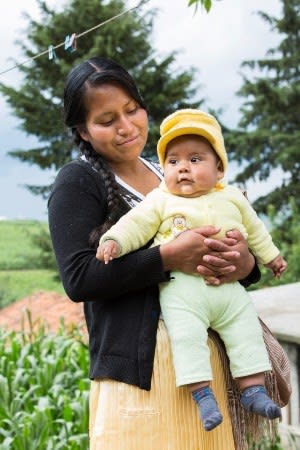
Through a new partnership, pharmaceutical giant Bayer and Vitamin Angels — an NGO providing lifesaving vitamins to mothers and children at risk of malnutrition — plan to provide 50 million pregnant women across 50 countries with access to vital micronutrients by 2030.
According to the World Health Organization, deficiencies in vitamin A, iron, iodine, and folate are particularly common during pregnancy. While deficiencies of vital vitamins and minerals such as these can have significant repercussions at any stage in life, a deficiency during pregnancy can impact the child across its life span.
“This can lead to malnutrition, and that contributes to almost half of child deaths under 5. Among undernourished children who survive, more than a quarter suffer from things like stunted growth and impaired neurological development and learning,” said Daniella Foster, global vice president and head of public affairs, science, and sustainability at Bayer. This can go on to impact a child’s ability to learn and later to earn an income, she added.
The Nutrient Gap Initiative launching this week aims to increase education around nutrition, accelerate the rollout of multiple micronutrient supplementation, or MMS — a formulation of essential vitamins and minerals that women need to help ensure their health, a healthy pregnancy, and a healthy baby — and advocate for integration into government health programs.
Speaking to Devex, Foster discussed how micronutrient deficiency impacts those living in low- and middle-income countries, the barriers to tackling it, and how Vitamin Angels and Bayer plan to break those down.
This conversation has been edited for length and clarity.
How do micronutrient deficiencies disproportionately affect women and children in low- and middle-income countries?
If left unaddressed, intergenerational cycles of undernutrition result in health and economic disparities for those individuals and societies. Essentially, those who experience and survive undernutrition in their first 1,000 days — from conception to 2 years of age — are themselves more likely to form families that are also both poor and undernourished. That then repeats a cycle over and over again.
For example, children deprived of essential nutrients may struggle to do well in school, get a good job as an adult, and are at greater risk of poverty as an adult. This hidden hunger — or “silent pandemic,” as we call it — perpetuates poverty over generations because of the impact it has on a child before birth and then long into their lives.
On a practical level, how can micronutrient deficiencies among vulnerable populations be remedied, and what are the barriers to doing so?
There are three key pieces to this. One is intervention. Many underserved communities lack access to fundamental vitamins and minerals because of poverty and food insecurity.
The second area is around education. Nutrition education is a critical and often neglected aspect of maternal and child health and well-being. If health systems lack the capacity to provide quality education and behavior-change counseling strategies, then the provision of multiple micronutrients will not be as successful at creating long-term, systematic change.
The third aspect of this is advocacy. Governments and policymakers can make large-scale impact when they include health literacy and education and supplementation into standards of care.
Tell us more about how Vitamin Angels and Bayer will work through The Nutrient Gap Initiative.
What I think is truly special here is that unlike most partnerships in this space — which might be donation-only — we’re really looking to address the long-term and structural barriers to accessing micronutrients through the facets that I spoke about earlier: the intervention component, the health education component, and the advocacy component.
Even within interventions — or what you might think about as donations — within this program, they’re unique because they actually are true interventions, meaning there is a 180-day intervention for pregnant women that is coupled with health education and also engagement with local governments to create long-term sustainable change and also a pathway to drive access in that community over the long term.
The program will start immediately. It will reach approximately 4 million women and children annually around the world, in every single region, from Latin America to Africa to Asia-Pacific, the Middle East, and even in underserved communities in the U.S.
One element of the partnership is rolling out a nutrition education curriculum to empower health care professionals as well pregnant women and children in underserved communities. How key is nutritional education, and do you think it is often lacking?
Nutritional education is critical, and it’s really one of the most neglected aspects of maternal and child health and well-being. If health systems lack the capacity to provide quality education and behavior-change counseling strategies, then vitamin and mineral donations alone will not be successful at creating long-term systemic change. If you don’t know that you have an increased need for vitamins and minerals during pregnancy, and the associated benefits of taking prenatal supplements, then you may not prioritize their use during pregnancy.
A program that’s just focused on vitamin donation isn’t really going to work or be set up for success over the long term because you also have to tackle those pieces of behavior change, adoption, and then creating long-term, systemic change.
The nutrition literacy program that we’re looking at will focus on maternal nutrition, including aspects of appropriate diet, weight gain, and how MMS plays a critical role in ensuring optimal pregnancy outcomes. Many people think, for example, that they can get all of their nutrients from food, but particularly during pregnancy, this is often not sufficient.
The first step is breaking the intergenerational cycle of health and economic disparity by raising awareness around the need for optimal nutrition during pregnancy and doing that among health care professionals and pregnant women.

How can other members of the global health community support this partnership?
The new initiative and the partnership between Bayer and Vitamin Angels will help to support the global movement around maternal health and also around the United Nations’ Sustainable Development Goal 3 on health and well-being for all. The Bayer-Vitamin Angels partnership aims to scale access of MMS, impacting up to 50 million pregnant women by 2030. This can be achieved by working with existing partners and tapping into partner networks. There’s a network of over 2,600 implementing NGOs on the ground in over 50 countries.
It is also critical, of course, to work with and partner with governments and health systems and also academia on things like health education and literacy. Those are some key areas where we’re looking to engage a number of partners, and the Bayer and Vitamin Angels partnership will raise awareness, enable introduction, and facilitate sustainable scaling of MMS around the world.
To view the original article, visit: https://www.devex.com/news/sponsored/q-a-new-partnership-set-to-close-the-micronutrient-gap-99021

